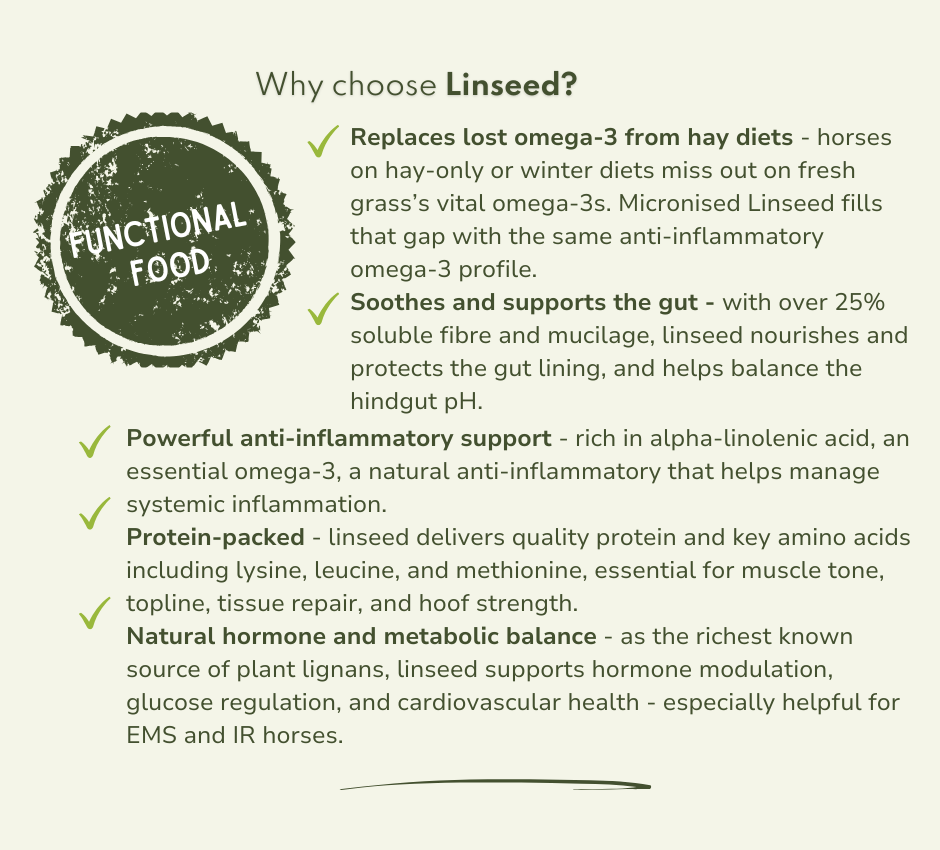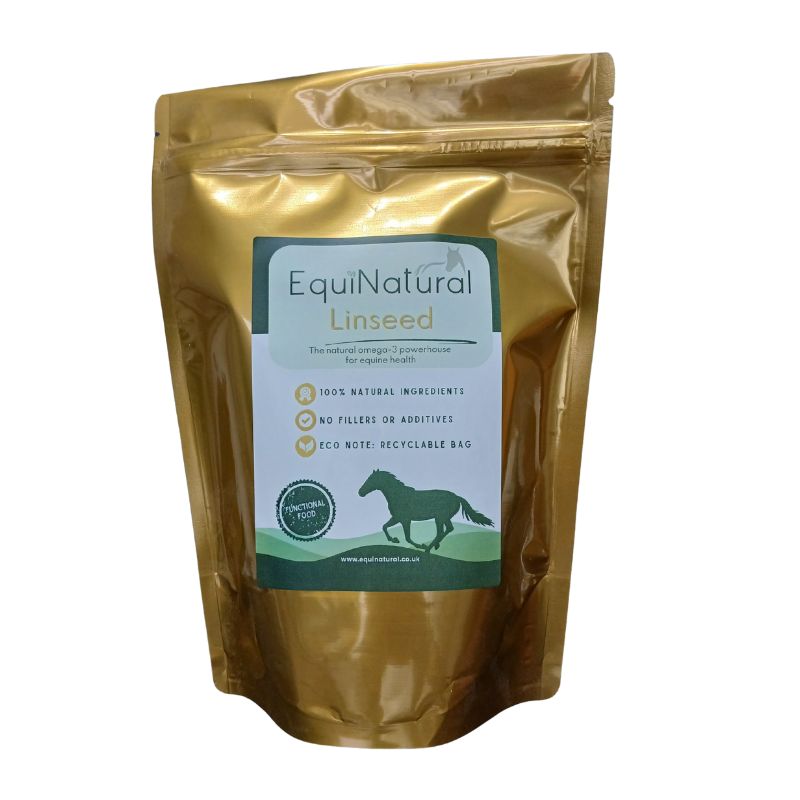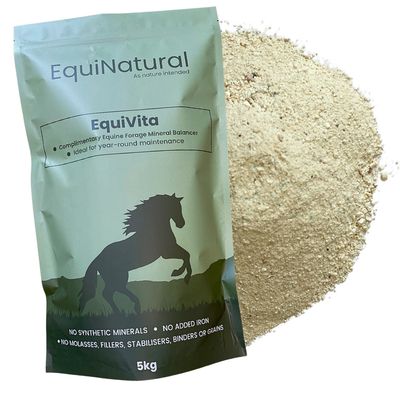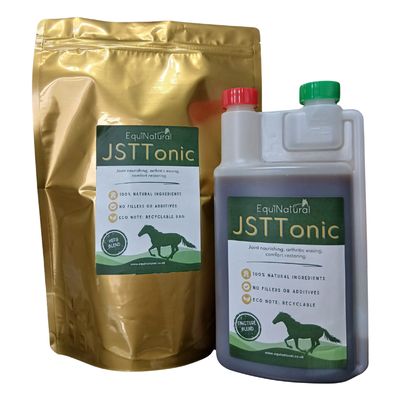LINSEED (Micronised) *Wholefood nutrient for horses - a natural omega-3 powerhouse for equine health
Linseed, aka flaxseed, is one of the oldest crops known to man, having been cultivated since the beginning of civilization. Its latin name, Linum usitatissimum, means ' very useful '.
A nutritional marvel, Micronised Linseed is a rich source of omega-3 fatty acids, soluble fibre, protein, and essential vitamins and minerals.
- Did you know? Horses on hay-only diets lack omega-3 fatty acids, which are lost during the drying and baling process. Micronised Linseed fills this gap, providing the same omega-3 profile as fresh grass - perfect for year-round nutrition.
- Backed by science: Research shows 100g/day of linseed provides omega-3 levels equivalent to pasture grazing for a 500kg horse.

Overview
Micronised linseed comes in at the s ame omega-3 profile as fresh, growing grass, so horses not on fresh grass will have a dietary deficiency of omega-3.
Here's the science - the horse’s natural diet of grass has an omega-3 to omega-6 fatty acid ratio of around 4:1, similar to other browse foods like leaves and buds, with summer growing grass coming in at around 4% fat, with 75% omega-3 as alpha-linolenic acid.
This level of intake isn't seasonally available all year, so outside of the growing grass period, or if a horse is on a hay-only diet, a study reported at the Equine Science Society showed via blood tests that 100g/day of linseed equals the same daily omega-3 intake as a horse on pasture – this applies to the average 500kg horse, so pro-rata it works out at 20g/100kg bodyweight.
NB - when grass is dried and baled as hay, the fragile omega-3 fatty acids are lost so it definitely needs to be fed.
Update Mar'2024 - Omega-3s Go Beyond Heart Health (Human health studies)
We’ve seen a ton of research over the years on the benefits of omega-3s but there’s new research showing new stuff. One recent meta-analysis of 40 randomized controlled trials found that high doses of EPA/DHA outperformed existing pharmacological interventions in preventing migraine frequency and severity.
Another recent study
found that omega-3 supplementation (as well as separate vit.D supplementation) reduced the risk of autoimmune disease. In this study, participants took the omega-3s for five years, but the risk reduction was still recordable two years after the study was finished.
Composition & Feed Guide
Micronised Linseed is a nutritional, functional food supplement and not veterinary medicine. For more information, refer to Dr Kellon's Horse Sense - Nutrition is not 'Alternative' Therapy .
Composition
100% pure micronised Linseed
Each serving of Micronised Linseed
delivers a powerhouse of omega-3 fatty acids, quality protein, and mucilaginous fibre to nourish your horse from the inside out. This natural, whole-food supplement supports gut health, hormone balance, coat condition, joint comfort, and immune resilience — bringing the benefits of fresh grass back into the bowl all year round.
Omega-3 Fatty Acids (Alpha-Linolenic Acid) – Essential for balanced immune and inflammatory function. Linseed’s omega-3 profile mirrors that of fresh grass, helping maintain cellular integrity, supple joints, and calm metabolic balance.
Soluble Fibre & Mucilag e – Naturally soothing and prebiotic. These compounds coat and protect the gut lining, support microbial balance, and help stabilise digestion.
Plant Lignans – Powerful phytonutrients that contribute to hormone balance, metabolic steadiness, and cardiovascular health. Converted in the hindgut to beneficial enterolignans , they also aid glucose metabolism.
High-Quality Protein & Amino Acids – Providing lysine, leucine, and methionine to support strong muscle tone, tissue repair, and healthy hooves.
Natural Vitamins & Minerals – A broad spectrum of nutrients, including magnesium, calcium, copper, zinc, and vitamin E, contribute to energy metabolism and antioxidant protection.
Micronised Form – Low-heat processing unlocks digestibility (up to 90%), ensuring nutrients are safely and efficiently absorbed without damaging delicate fatty acids.
Feed Guide
As a general rule of thumb, it's 20g/100kg bodyweight daily, based on a 500kg horse.
However, based on the seasonal changes of grass growth, here's a recommended feed-rate guideline:
- If your horse is on part grass/part hay , i.e. daytime turnout then stabled overnight, then feed 10g/100kg bodyweight daily.
- If your horse is on a full hay diet with no grass , or during winter , feed 20g/100kg bodyweight daily (or see our VitaComplete as a 3-in-1 convenience nutrient solution).
- If your horse is 24/7 grass during the summer , there's no need to feed linseed until winter.
1 x level 75ml scoop = 40-grams
Footnotes
- Laboratory tested for identification and compliance to the British and European Pharmacopoeia standards.
- Human grade.
- ♻️ Eco Note: Our packaging is recyclable and refillable.
- 🧊 Storage Tip: Keep cool and dry.
Clinical Considerations
Advisories
- New to linseed? Introduce gradually to allow the hindgut to adapt to increased fat and fibre levels.
- Store cool and dry- omega-3 oils are delicate and may oxidise if exposed to heat or humidity.
- Linseed is generally regarded as safe for pregnant/nursing mares.
- Safe for metabolic, EMS, and laminitic horses when fed within recommended guidelines - its low starch and sugar content make it suitable for restricted diets.
Contraindications
- It's very rare but may happen - some horses may experience flaxseed sensitivity: discontinue if any allergic reaction (itching, hives, loose droppings) occurs.
- Avoid feeding raw linseed: Always use micronised or boiled forms - raw seed can contain trace cyanogenic compounds that are destroyed by heat.
More ...
Why we think linseed is awesome
Linseed is a true nutritional powerhouse, offering a wealth of benefits for your horse’s condition, coat shine, joint comfort, hooves, and even itchy skin - just to name a few.
But there’s more:
Linseed is a gut-health superstar
Thanks to its high soluble fibre content (around 27%), linseed is rich in mucilage, which acts as a natural lubricant for sensitive guts. The process of micronization further enhances its benefits, altering the seed's structure to improve digestibility in the small intestine by up to 90%. This reduces the burden on the large intestine, helping to mitigate the risks of colic, laminitis, and acidosis.
Research also shows that feeding linseed meal supports better glucose control and higher levels of beneficial fatty acids:
"Data suggests that linseed fibre supplementation affects host metabolism by increasing energy expenditure, reducing obesity, and improving glucose tolerance." (Source: The American Physiological Society)
The omega connection
Linseed is best known for its high omega fatty-acid content, which remains intact thanks to the low-heat micronization process.
There are two essential classes of fatty acids that play key roles in immune function:
- Omega-3 (Alpha Linolenic Acid, ALA): Non-inflammatory and essential for a balanced immune response.
- Omega-6 (Linoleic Acid, LA): Pro-inflammatory and necessary for robust immune reactions.
These fatty acids work together to create signalling molecules, with omega-3s serving as anti-inflammatory agents and omega-6s driving inflammatory signals. Both are critical for maintaining a resilient immune system.
Protein powerhouse
At around 25% protein, linseed provides key amino acids essential for equine health.
- Lysine: Often deficient in equine diets and crucial for muscle development.
- Leucine: The most abundant amino acid in skeletal muscle.
- Methionine: A sulphur-containing amino acid that supports strong hooves.
Why linseed meal is better than oil
We strongly recommend using micronized whole linseed meal over extracted linseed oil.
Why? - Linseed meal is a whole food, retaining its natural nutrients, including fibre, vitamins, and minerals. Extracted oil, on the other hand, is delicate, prone to oxidation, and lacks the full spectrum of nutrients. Furthermore, horses' sensitive digestive systems aren’t designed to handle additional liquid oils beyond what’s naturally present in their forage, which can disrupt digestion.
Let's talk lignans: nature’s hormone balancers
Linseed is the richest known source of lignans, plant compounds with hormone-balancing and cardiovascular benefits.
When digested, the microbiome converts lignans into enterolignans(enterodiol and enterolactone). These "mammalian lignans" offer:
- Anti-inflammatory benefits
- Improved gut health
- Hormone-regulating effects
- Bone density maintenance
Studies have linked enterolignans with a lower risk of insulin resistance (IR) and type 2 diabetes—factors directly relevant to equine metabolic health. Additionally, high lignan levels may reduce the effects of estrogen-driven cancers.
What about phytoestrogens?
Some worry about the estrogen-like properties of phytoestrogens in linseed, but as Dr. Kellon states:
"Critics point to high levels of phytoestrogens, but there is not a single report of an estrogenizing effect from flax in any species, even at up to 10% of the diet."
(Source: Dr. K’s Horse Sense)
In summary
Micronized linseed meal is a multi-functional, nutrient-dense superfood for horses, offering benefits for gut health, immune support, joint comfort, and overall wellbeing. Why settle for less when you can give your horse the whole-food goodness of linseed?
Sources:
http://www.the-aps.org/mm/hp/Audiences/Public-Pres...
Clinical Endocrinology 2002;56(3):321
Dr K's Horse Sense ' Omega-3 Fatty Acid Sources for Horses
'
© EquiNatural 2026. All content is original work protected under copyright, and may not be re-published, duplicated, or rewritten for commercial use without permission.




